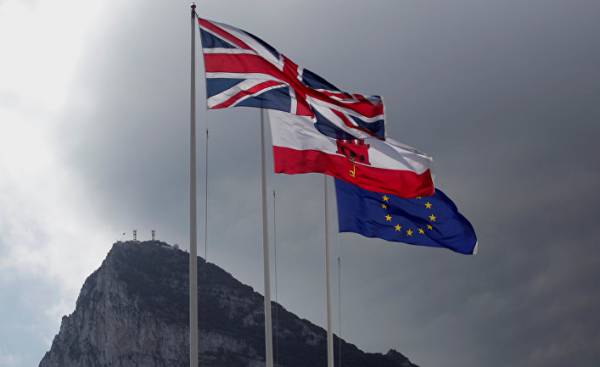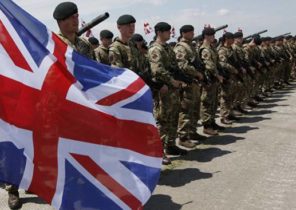
As soon as Michael Howard (Michael Howard), the former Chairman of the British Conservative party, urged his successor Theresa may “support the people of Gibraltar”, as in 1982 made for the sheepmen of the Falkland Islands Margaret Thatcher, then with new force has inflamed age-old dispute between Britain and Spain over Gibraltar. By submitting an application on withdrawal from the EU, which was submitted to Brussels last week, the Prime Minister simply forgot that England took ownership of 6.5 square kilometers large rock on the South-West of Europe. Even if you may inform that she will leave the Royal Navy in his native port, Spanish politicians do not miss the chance to demonstrate once again Europe’s sinister colonial ambitions of great Britain.
In 2013, London was less restrained. The predecessor of Mei David Cameron used the 300 year anniversary of the peace of Utrecht as a reason again to send flotilla to Gibraltar. Supposedly she was supposed to remind you about in 1713 the peace Treaty that ended the war of the Spanish succession against France and allied with Spain. As a result of victory, along with Menorca and a monopoly on the slave trade with the Spanish colonies in America England received Gibraltar rock.
Of course, four years ago, it was about more. The campaign had to show that “we will not look through your fingers, if people in Gibraltar will be subject to threats or pressure,” as expressed by the European Minister Cameron. It was and is about the fishing rights, increased monitoring of illegal immigrants and solidarity, as expressed by Michael Howard, “the Spanish-speaking countries” Argentina and Spain in a dispute over the Falkland Islands.
Will have to return to three centuries ago, to understand the close relationship between Britain and fortress on the rock that is inhabited by 30 thousand people and several dozen monkeys. On a completely different scale than in the case of the Falklands, we are talking about the identification of England and “British” nation. In the nineteenth century, its leaders took Gibraltar, along with the Suez canal, the Turkish Straits and Singapore, to the important strategic position of the Empire. None of it is left except the rocks, remaining a symbol of power.
The war that made Gibraltar a British possession, were deep in memory still of the United Kingdom. During the war of the Spanish succession from 1701 to 1714 England entered into a coalition with Austria and the Netherlands to limit the hegemonic ambitions of France. The heart of this Union until his death in 1702 was William III of orange, king of England, Scotland and Ireland, and ruler of the Netherlands. During the Glorious revolution 1688/89, the London Parliament had called him to the throne. With his arrival began a parliamentary monarchy. And with the victory — the rise of Britain to world power.
Miraculously one General who served the Habsburg Emperor, succeeded on 4 August 1704 to win, before the Spanish, the fortress of Gibraltar. Prince George of Hesse-Darmstadt commanded more than 1800 Dutch and British soldiers who resign surrendered the castle, after the British ships shot defenses. Prince has used brilliant tactics, shifting his attack in the morning at the Siesta hours.
All attempts to win was not successful
The allied French and Spaniards immediately took all efforts to retake the rocky island. But Prince George, despite the desperate minority, keep quiet, rest ensured that the forces of the English fleet. After the Imperial Governor near Barcelona suffered the loss of soldiers, the command took over the British commandant at Gibraltar. And so remains to the present day. Since 1830, the rock is a British colony.
Since then, many times the Spanish troops tried to conquer Gibraltar. During the Anglo-Spanish war, which lasted from 1727 to 1729, the army of about 20 thousand people laid siege to the fortress. They were opposed by only 3200 people. But with them was the British fleet, which provided supplies and bombarded the Spanish positions. After almost four months of siege had to stop.
Between 1779 and 1783 years of Spanish and French troops repeatedly jointly made a new attempt, one of their allies was the rebellious English colonies in North America. But unlike the lesions in a New Light here, British troops remained unbeaten, primarily because a Large fleet had been able to break through the blockade. However, historians asked a hypothetical question what would have happened with the American revolution, if the Royal Navy wasn’t busy in Europe, and could turn against her with all his might.
The third battle of Gibraltar took place near the fortress. It was the battle of Trafalgar, with the combined French-Spanish fleet of Napoleon I. the Victory of the fleet under the command of Admiral Horatio Nelson on 21 October 1805, was his most famous triumph and, after the loss of North American colonies, the basis for the “Second British Empire”, which eventually covered a quarter of the Earth.
What was the large fortress at the entrance to the Mediterranean sea, Napoleon learned a few years ago, when in 1798 the British fleet under the command of Nelson sank his ships of the Nile and this dealt a fatal blow to his Egyptian expedition. Of the battle, wrote the German historian Ludwig Dehio (Ludwig Dehio), when after the Second World war was subjected to the now-classic analysis of British policy in his book “Balance or hegemony” (“Gleichgewicht oder Hegemonie”), written in 1948:
“Only now (after Aboukir; approx. ed.) was revealed to all the world, and the historic significance of the penetration of the British in the Mediterranean during the war of the Spanish succession and their stubborn defense of the rock of Gibraltar against a powerful attack afterwards. Here it would be necessary to break the invisible network that stretched around the teeming life of a great Peninsula of Europe, a small fleet of wooden warships, sent fragile and relatively sparsely populated island. But the network is not susceptible to rupture test. Thanks to the Gibraltar Nelson broke into the Mediterranean sea”.
Today it seems that after the vote England for Pexit and the possible separation of Scotland and Northern Ireland rock monkeys and its 30 thousand loyal subjects to the crown were the last piece of self-assertion, is still in the UK.







